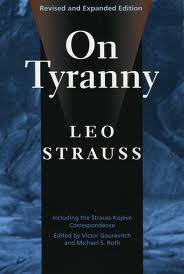On Tyranny: An Interpretation of Xenophon's Hiero, Including the Strauss-Kojeve Correspondence, Victor Gourevitch and Michael S. Roth, eds., University of Chicago Press, 1961, reprinted 1991, 2000. Originally Published as On Tyranny: An Interpretation of Xenophon's Hiero, Political Science Classics, 1948.
Excerpt:
While Xenophon seems to have believed that beneficent tyranny or the rule of a tyrant who listens to the counsels of the wise is, as a matter of principle, preferable to the rule of laws or to the rule of elected magistrates as such, he seems to have thought that tyranny at its best could hardly, if ever, be realized. This is shown most clearly by the absence of any reference to beneficent and happy tyrants who actually existed, not only from the Hiero, but from the Corpus Xenophonteum as a whole. It is true, in the Education of Cyrus he occasionally refers to a tyrant who was apparently happy; he does not say, however, that he was beneficent or virtuous. Above all, the monarch in question was not a Greek: the chances of tyranny at its best seem to be particularly small among Greeks. The reason why Xenophon was so sceptical regarding the prospects of tyranny at its best is indicated by a feature common to the two thematic treatments of tyranny at its best which occur in his works. In the Hiero as well as in the Memorabilia, the tyrant is presented as a ruler who needs guidance by another man in order to become a good ruler: even the best tyrant is, as such, an imperfect, an inefficient ruler. Being a tyrant, being called a tyrant and not a king, means having been unable to transform tyranny into kingship, or to transform a title which is generally considered defective into a title which is generally considered valid. The ensuing lack of unquestioned authority leads to the consequence that tyrannical government is essentially more oppressive and hence less stable than non-tyrannical government. Thus no tyrant can dispense with a bodyguard which is more loyal to him than to the city and which enables him to maintain his power against the wishes of the city. Reasons such as these explain why Xenophon, or his Socrates, preferred, for all practical purposes, at least as far as Greeks were concerned, the rule of laws to tyranny, and why they identified, for all practical purposes, the just with the legal.
The “tyrannical” teaching—the teaching which expounds the view that a case can be made for beneficent tyranny, and even for a beneficent tyranny which was originally established by force or fraud—has then a purely theoretical meaning. It is not more than a most forceful expression of the problem of law and legitimacy. When Socrates was charged with teaching his pupils to be “tyrannical,” this doubtless was due to the popular misunderstanding of a theoretical thesis as a practical proposal. Yet the theoretical thesis by itself necessarily prevented its holders from being unqualifiedly loyal to Athenian democracy, e.g., for it prevented them from believing that democracy is simply the best political order. It prevented them from being “good citizens” (in the precise sense of the term) under a democracy. Xenophon does not even attempt to defend Socrates against the charge that he led the young to look down with contempt on the political order established in Athens. It goes without saying that the theoretical thesis in question might have become embarrassing for its holder in any city not ruled by a tyrant, i.e., in almost every city. Socrates’ and Xenophon’s acceptance of the “tyrannical” teaching would then explain why they became suspect to their fellow-citizens, and, therefore, to a considerable extent, why Socrates was condemned to death and Xenophon was condemned to exile.
It is one thing to accept the theoretical thesis concerning tyranny; it is another thing to expound it publicly. Every written exposition is to a smaller or larger degree a public exposition. The Hiero does not expound the “tyrannical” teaching. But it enables, and even compels, its reader to disentangle that teaching from the writings in which Xenophon speaks in his own name or presents the views of Socrates. Only if read in the light of the question posed by the Hiero do the relevant passages of Xenophon’s other writings reveal their full meaning. The Hiero reveals, however, if only indirectly, the conditions under which the “tyrannical” teaching may be expounded. If the city is essentially the community kept together and ruled by law, the “tyrannical” teaching cannot exist for the citizen as citizen. The ultimate reason why the very tyrant Hiero strongly indicts tyranny is precisely that he is at bottom a citizen. Accordingly, Xenophon entrusted the only explicit praise of tyranny which he ever wrote to a “stranger,” a man who does not have citizen responsibilities and who, in addition, voices the praise of tyranny not publicly but in a strictly private conversation with a tyrant, and for a purpose which supplies him with an almost perfect excuse. Socrates did not consider it good that the wise man should be simply a stranger; Socrates was a citizen-philosopher. He could not, therefore, with propriety be presented as praising tyranny under any circumstances. There is no fundamental difference in this respect between Xenophon and Plato. Plato entrusted his discussion of the problematic character of the “rule of laws” to a stranger: Plato’s Socrates is as silent about this grave, not to say awe-inspiring, subject as is Xenophon’s Socrates. Si-monides fulfills in the Corpus Xenophonteum a function comparable to that fulfilled in the Corpus Platonicum by the stranger from Elea.
Online:
Google Books
Amazon

